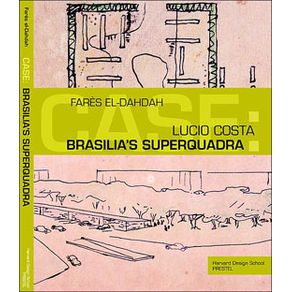Nearly half a century after its inception, the city of Brasilia, designed by Lucio Costa and Oscar Niemeyer, and based on Le Corbusier's plans, continues to be one of the world's most widely debated architectural projects. Envisioned as an egalitarian, harmonically conceived environment, the city was designed to foster collectivity and integration. Central to this effort was the idea of the 'Superquadra', large neighborhoods, each with their own schools, shopping, and entertainment complexes. The latest volume in the CASE series, published in collaboration with Harvard University's Graduate School of Design, takes a new look at the Superquadra as a utopian concept, analyzing both its strengths and weaknesses. It features a rare interview with planner Lucio Costa as well as essays exploring the historical and cultural contexts of Brasilia, day-to-day life in the city, and its technical complexities and realities. Rare sketches by Costa as well as historical and contemporary illustrations round out.



